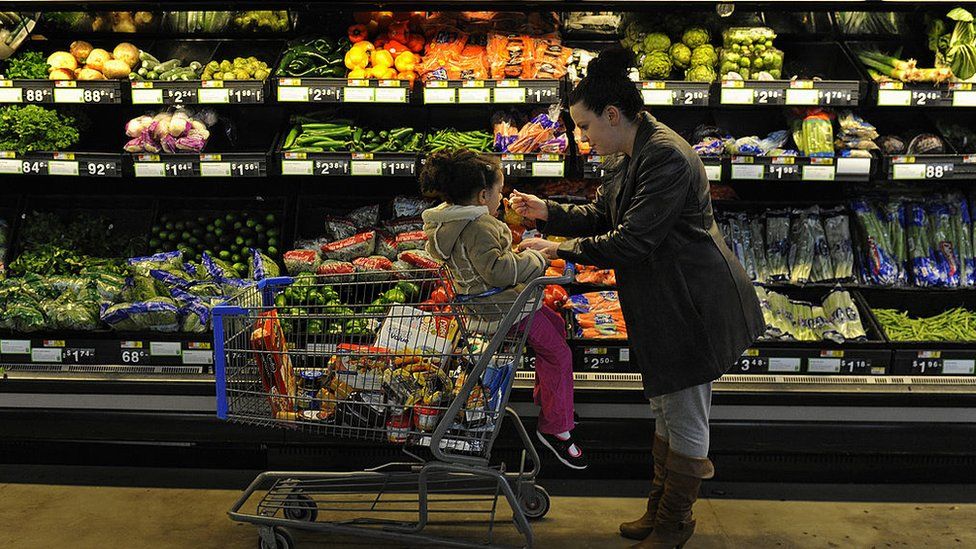ARTICLE AD BOX
 Image source, Getty Images
Image source, Getty Images
Snap participants will see a minimum reduction of $95 per month
By Chloe Kim
BBC News, New York
Millions of Americans are about to be without a pandemic-era benefit that helped them buy groceries, even as inflation has caused food prices to soar.
The Supplemental Nutrition Assistance Program (Snap) benefits were increased by federal lawmakers during Covid-19, but a recently passed spending bill in Congress sunsets the emergency allotments on 1 March.
As of last October, 42.3 million Americans participated in Snap.
Now, their payments could be cut by $95 (£78) per month per household. Bigger families could see an even greater reduction to monthly payments.
For many, it could come as a surprise.
"Not everyone is following the news very closely and so the first instance at which they're going to know about this reduction is when they see what their payment is," said Radha Muthiah, President of Capital Area Food Bank in Washington DC.
"So that is my biggest fear, that it's going to hit people quite suddenly and they're going to be shocked."
Even with the emergency allotment to Snap, many food banks saw an uptick in need during the pandemic and, as inflation has risen, many are preparing for a significant increase once the additional benefits end.
According to Urban Institute, a progressive think tank, the emergency Snap allotments helped keep 4.2 million people out of poverty in the fourth quarter of 2021, reducing poverty by 9.6% in states with emergency allotments.
As of now, 18 states have already discontinued the increased allowance, with the rest of the 32 states to follow suit on Wednesday.
"While there's no doubt that families will experience challenges when the remaining pandemic benefit supplements end, we are also collaborating with states and external partners... so that they can manage the changes with knowledge and confidence," said Stacy Dean, the Department of Agriculture's deputy undersecretary of food, nutrition, and consumer services, in comments prepared for a Senate committee.
'We used to donate to this food bank, now we rely on it'
While the pandemic is in the rear-view mirror for many, low-income people are facing additional financial hardships - notably inflation and increased rents in cities. Food prices rose by about 10% in 2022.
Because of inflation, many food banks have already been seeing a strain.
The Greater Chicago Food Depository's network served 24% more guests this January than they did one year ago. More working or middle-class families, who would not have frequented food banks before, are now newly dependent on them to supplement their grocery store trips, where their budget does not stretch as far, says Man-Yee Lee, of the Greater Chicago Food Depository.
In preparation for the rollback, food banks have been trying to spread awareness to Snap participants - like telling people to document and report changes to their financial situation, which can affect their benefits when they renew them.
"You could even argue, before the pandemic came, we were dealing with a hunger crisis," said Ms Lee. "At a time when food prices are elevated it's a terrible time to roll back these benefits."
Even during the time that emergency allotment were in place, Food Banks for NYC saw an 80% increase in visits to their network of 800 food pantries and soup kitchens. Zac Hall, vice-president of anti-poverty programmes at Food Bank for NYC, said the end of emergency benefits will add to their strain - but they will also impact local businesses.
Since Snap benefits can be redeemed at most grocery stores and in New York City farmers markets, shoppers who relied on the benefits may be spending less, hurting stores' bottom lines.
This change is going to "translate into other economic impacts for those commercial businesses," he said.
Several employees at food banks interviewed by the BBC said that there is a growing need for volunteers and donations.
"We need manpower," Ms Lee said, explaining that volunteers help sort food and load up people's cars.
While food is always welcome, financial donations are more economical, she said.
Being one of the largest food banks in the country, she said they can use their purchasing power to get more value for their money - for every dollar, they can purchase at least three meals.
"Every little bit counts," Ms Lee said.

 2 years ago
43
2 years ago
43








 English (US) ·
English (US) ·